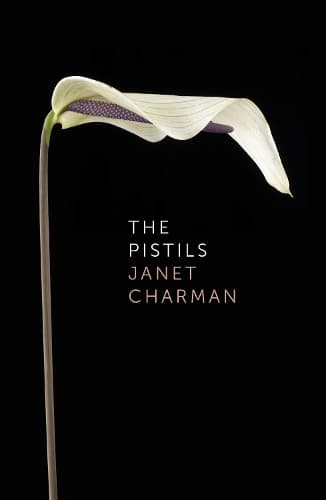Review: The Pistils
Reviewed by Siobhan Harvey
Auckland poet Janet Charman began her publishing career with a female collaborative collection, Drawing Together published by famed women artists’ collective publisher Spiral back in 1985. The same year that another Spiral book, The Bone People by Keri Hulme took out the Booker Prize for Fiction. Humble beginnings and all that.
Since then, for Charman, there have been nine solo collections, each – like the first foray into publishing and the mission of that first publisher – giving voice to women and their experiences previously marginalised and silenced. For Charman, the accolades, including the prestigious 2008 Montana Book Award for Poetry have accrued, testament to a writer adept in her craft and literary philosophy.
Her latest, The Pistils, offers a continuation of the author’s chronicling of gender concerns. Poems with titles such as rhymes for clitoris, womb and cunt speak unapologetically of the discourse the reader encounters throughout the book, with lines from the latter verse such as:
to dehumanize his victim
the soldier uses a repeatedly bleeped
single-syllable
any
woman
intuits it
Elsewhere, as in the final poem, stamen: stawomen, analogy is used to further Charman’s feminist exploration, with an examination of the evolutionary characteristics female Jacobin hummingbirds used as a motif to deconstruct contemporary toxic masculinity. Not that Charman dismisses the predatory sexual politics of the past. In poems like in besidedness and The House of the Talking Cat, one senses the author drawing on the manna derived from her four-decade literary career to call out the injustices of a bygone age, particularly one associated with writing. In the latter poem particularly, her voice is lucid and strong:
in the Letters
James K Baxter tells a lover
he rapes his wife
at the time
what he does to Mrs Baxter
is perfectly legal
so when he makes his boast in writing
to the woman with whom he’s having an affair
he flaunts the fact he’s above the law ….
This looking back through a gendered lens is often nostalgic in nature in The Pistils. Nowhere more so than the tender opening suite of poems devoted to family and memory, high days and holy days. Christmas, New Year, Waitangi Day, Easter, Anzac Day: these and other days of national significance, as well as more familial commemorations, are revivified in this sequence through personal story and slivers of remembrance.
5: Picnic Days
from wherever we were
she would get us
in the car
with a picnic
own crust apple pie or mince and veg
sometimes bacon and egg
a boiled potato sunk with butter
and eaten with black sand pepper
like sunset ….
Here, as elsewhere, women are centre-stage as organizers and as gatekeepers, even in their un- or underprivileged status in the patriarchy of the society being scrutinized. Some resisted their oppression, Charman reminds us, some deconstruct it later through their writings, and some wielded power wherever they found it, even if it was the power of the domestic realm.
Its gynocentric thematic aside, the thing which holds this rich collection together is a writing style steeped in semiotic sensibilities, such as a rejection of dominant upper-case lettering and a fluidity of language and word play, as in the poem, daughters depart:
they are in the waves
beating for shore
as the little fish of their absence
swim in the fissures of my long-grown bones
currents take hold
until
from sentiment i fall
to sediment …
There are moments when this feminist reader disagrees with aspects of the book’s depiction of gendered mores; womb’s apparent portrayal of trans women as lesser, for instance. But these are rare instances.
Crafted, woven with feminist ideology and navigating the intersections of memory, gender and politics, Janet Charman’s The Pistils is an accomplished work.
Reviewed by Siobhan Harvey
